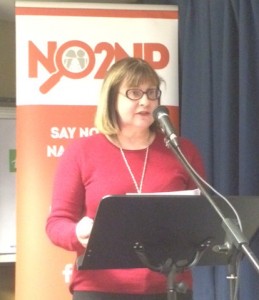Blog
Keeping you up to date on the progress of the Named Person scheme and the NO2NP campaign.
Keeping up appearances of ‘getting it right’
Posted 9 years agoBy Alison Preuss of Home Education Forums
Back in September 2016, Deputy First Minister John Swinney reassured Parliament that Named Person schemes which were already operating on a non-statutory basis – including the much-vaunted Highland pilot – were not affected by the Supreme Court judgment because they were acting in accordance with the existing legal framework.
His assertion that it would be ‘business as usual’ drew sharp criticism from families across Scotland, whose personal data had already been collected and shared by public and third sector bodies without their knowledge or consent – and who had the damning evidence to prove it.
What’s more, current policy documents – including the Highland Practice Model and the practitioner toolkit published on Perth and Kinross Council’s website – proved beyond all doubt that non-consensual data processing had become well established and embedded across services over the preceding several years.
In a valiant effort to keep up appearances of ‘getting it right’ post-judgment, the Scottish Government sought to validate its own Named Person guidance by publishing an update on its website.
It claimed that the guidance “remains valid”, but that “some of the information will need to be revised”, namely the information sharing provisions of Part 4 and 5 of the Children and Young People (Scotland) Act 2014 as the ruling “requires these provisions to be amended in order for them to be compatible with Article 8 of the ECHR”.
Actually, the legislation needs to be re-drafted and approved by Parliament, and it will also need to comply fully with human rights and data protection laws to the satisfaction of the Supreme Court. Data processing without freely given informed consent is no longer a legislative option and legal remedies will be available to those whose rights have been breached.
The revised statement goes on: “The current draft statutory guidance on sections 23, 26, 27 and 40 should be disregarded for the time being, until it is revised following amendment of the provisions. Any information shared by and with those identified as Named Persons under GIRFEC policy can and should continue to operate in accordance with the existing legal framework and guidance on data sharing, human rights and children’s rights. This includes the Data Protection Act 1998 and the Human Rights Act 1998. Read the Policy Update on delivery of the Getting it right for every child approach here.”
In fact, current information sharing guidance does not accord with the existing legal framework, as upheld by the Supreme Court, since it encourages non-consensual data processing on the basis of any vague, undefined ‘wellbeing’ concern, as opposed to adherence to the legally permissible threshold of risk, or likely risk, of significant harm to a child.
The question remains: was the Deputy First Minister unaware of this?
NO2NP Roadshow roundup: Melrose, Broughty Ferry and Castle Douglas
Posted 10 years agoThe NO2NP Roadshow team has been really busy over the past week or so, clocking up three events in eight days (plus a great Action Day in between – more about that later in the week!). We’ve been responding to demand from various parts of the country to hold roadshow events in their area, so here’s a taste of what happened at these three venues:-

Melrose
Their first stop was the picturesque Borders town of Melrose on Monday night last week, when a good number of locals turned up to hear from the team.
Gordon Macdonald, Parliamentary Officer for CARE for Scotland, spoke about the reasons for the NO2NP campaign and referred to comments made online by Jim Terras, a Scottish Borders Council Training and Development Officer for Child Protection. Terras had remarked that he didn’t think the Government should be basing their opinions on the views of “fringe groups” opposed to the Named Person scheme, “who don’t really represent the general public”.

Gordon went on to point out that in a recent ComRes Poll, 64% of the Scots polled considered that the scheme was “unduly intrusive” into family life and 80% considered that the focus of child protection resources should be on truly vulnerable children and not every child.
We were then delighted to welcome Professor John Raven from Edinburgh to speak about his 50 years of academic experience in the areas of family, education and sociology. He said that parents are children’s most important educators in terms of instilling all the most important values in life, so having a Named Person to dictate what this should look like was quite wrong.
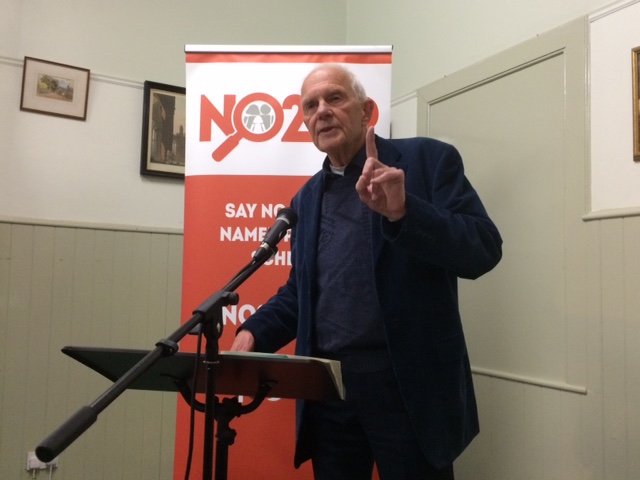
One of the things the Professor had noticed over his long career was the deprofessionalization of teachers, doctors and social workers by Government, who have increasingly imposed their own agenda on these professions. And now even parenting has been “deprofessionalized” under this scheme – in line with what is happening across society.
There was a lively Q&A, during which one mum asked the moving question: “Do the same people who failed my children so abysmally now think they can tell me they know better?”
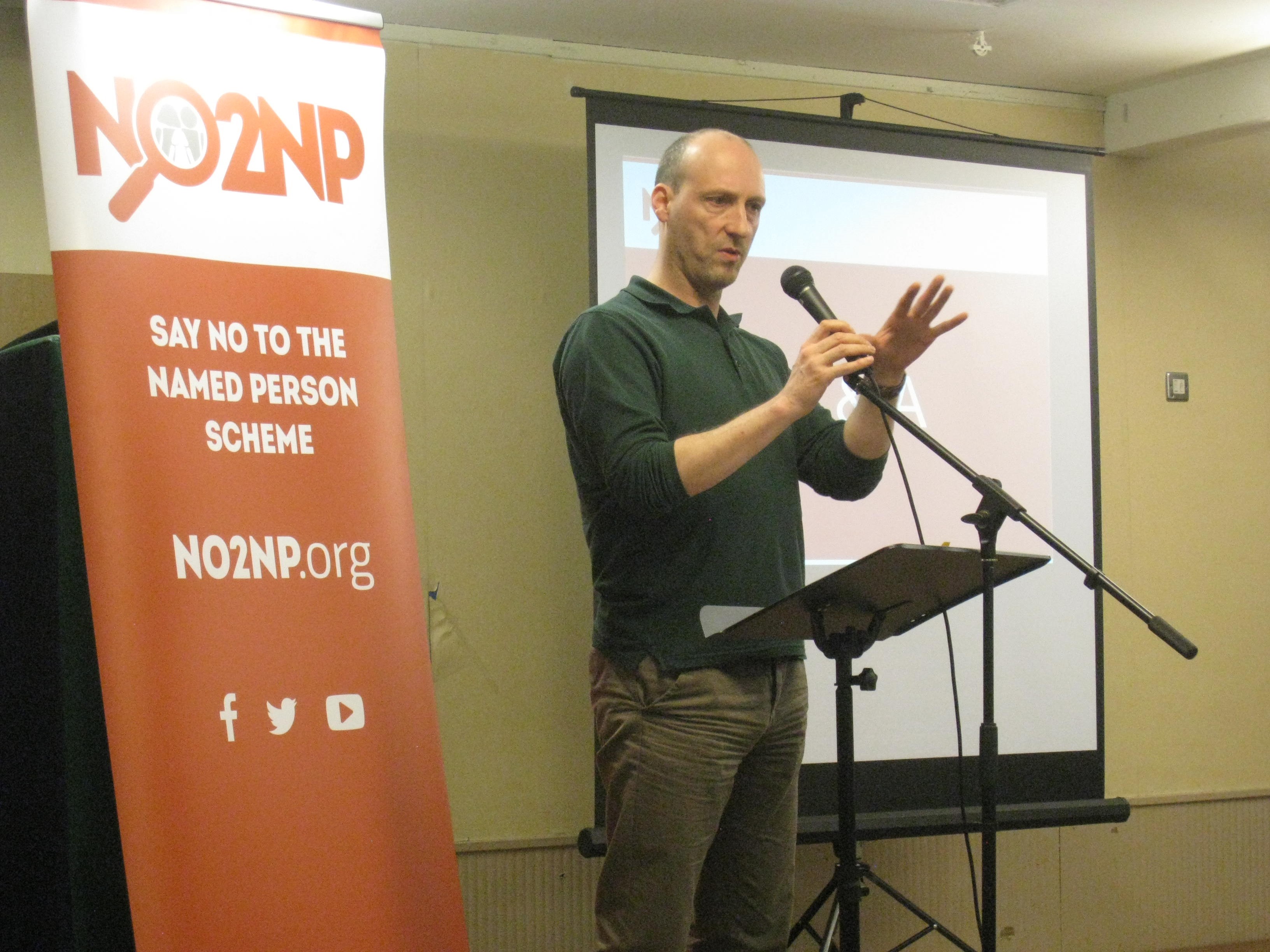
Broughty Ferry
The team’s next stop was Broughty Ferry last Friday to address a packed meeting at the town’s YMCA.
The meeting was chaired by Dr Stuart Waiton, a Sociology lecturer from Abertay University, who recently said that Tayside had some of the strongest opposition to the Named Person scheme. The passionate audience certainly had plenty to say, with one lady asking “What about the really vulnerable children? What will happen to them? They’ll go right down the list and be lost in the process!”
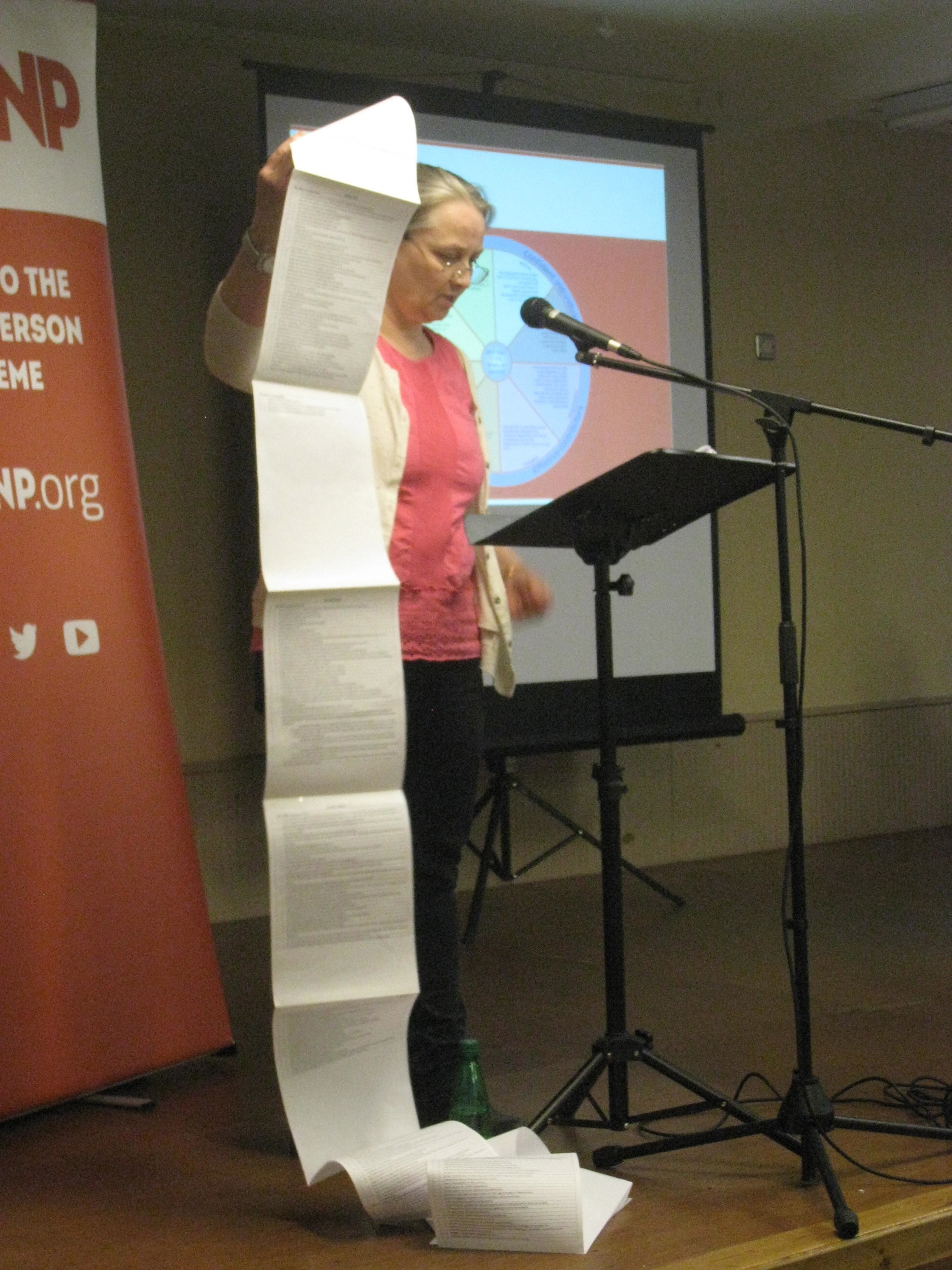
Lesley Scott from TYMES Trust set out how the Universal Health Visiting Pathway, due to be introduced on 31 August, will be a massive invasion of privacy for every young family in Scotland. A huge amount of sensitive information will be shared about their personal details, all intended to “promote, support and safeguard” the wellbeing of every child. However, the term “wellbeing” is nowhere defined in either the legislation or the guidance. This point was made in a video clip Lesley showed from a Holyrood debate last year, where an MSP in favour of Named Persons refused to answer a question about the definition of wellbeing, but instead ridiculed his colleague for asking the question.
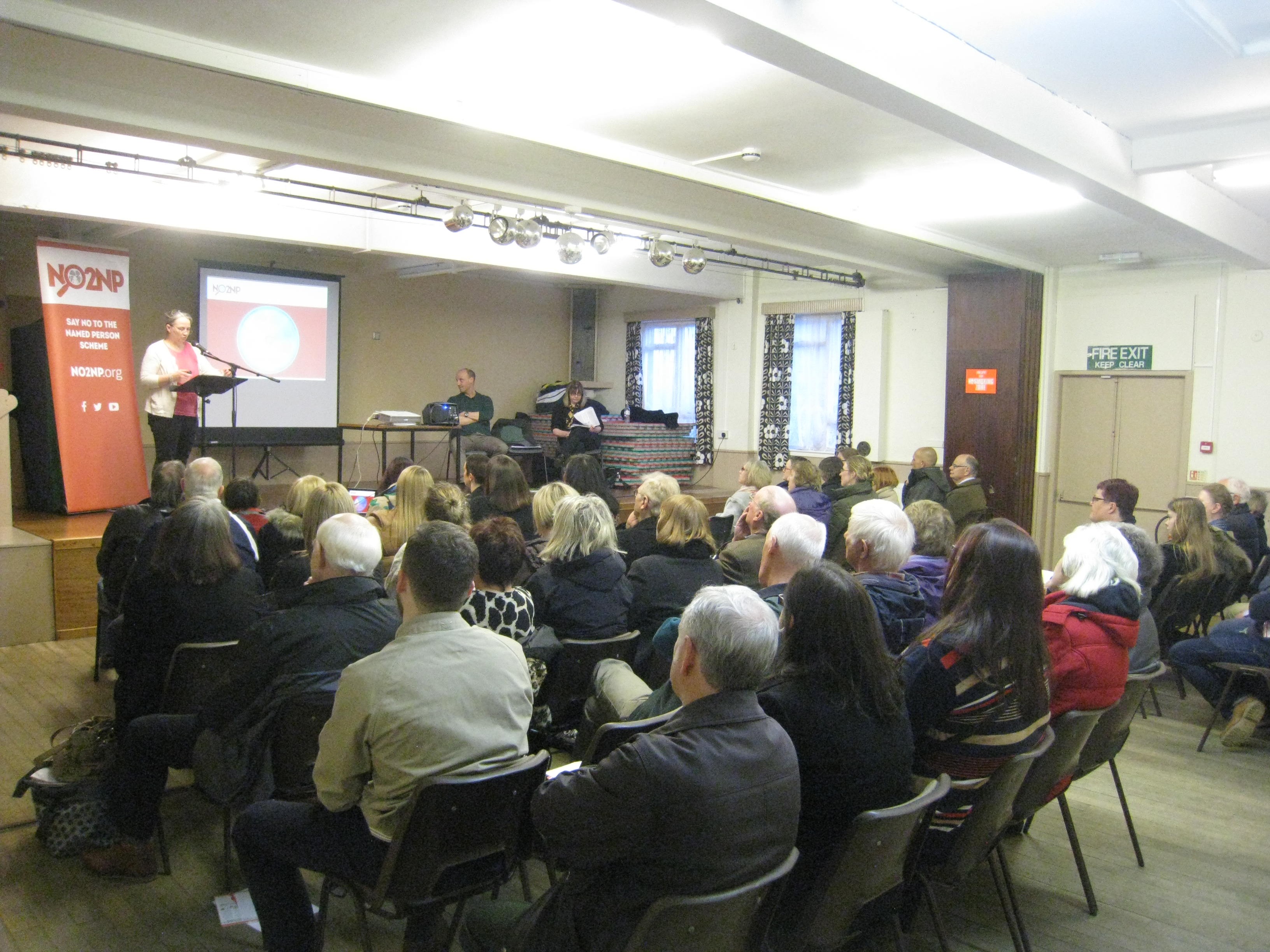
Lesley finished by saying: “Intervention is no longer about whether a child is at risk of significant harm, but rather whether the child is progressing in a manner the state regards as acceptable towards meeting outcomes set by the state.”
Alison Preuss from the Scottish Home Education Forum spoke about her background in elective home education and her experience in challenging breach of privacy law in various government schemes over the years.
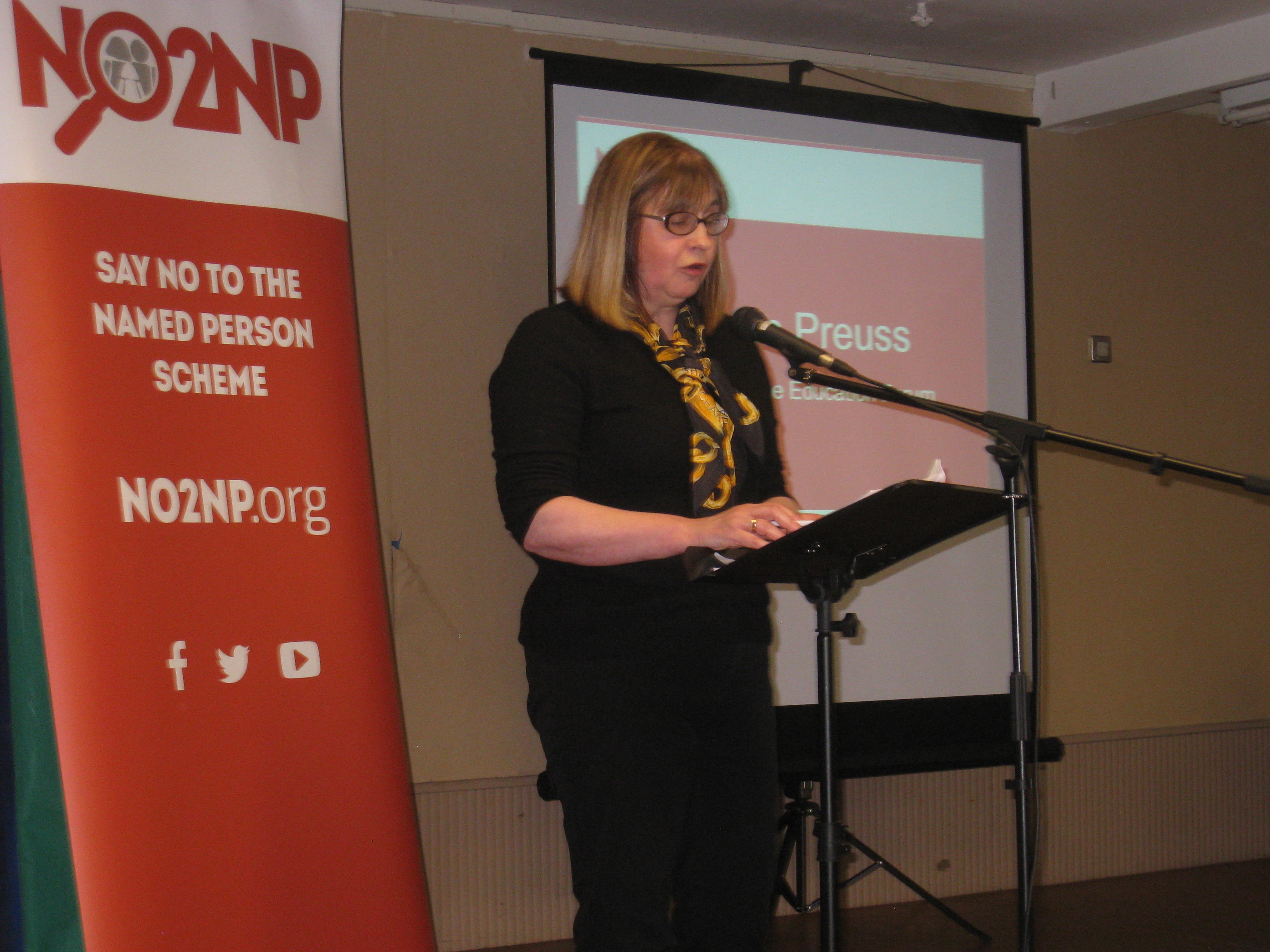
She made reference to the GIRFEC Cluedo article that appeared in the press recently. The aim of the game (used in training) is to get professionals to determine parents’ capacity to provide “wellbeing” by data mining without consent “at even the lowest level of concern”, as opposed to on child protection grounds. Alison went on: “Privacy is being systematically demolished on the basis of mere suspicion, allowing the state to call up a single view of any citizen at the click of a mouse, to more easily identify those of us in need of remediation”.
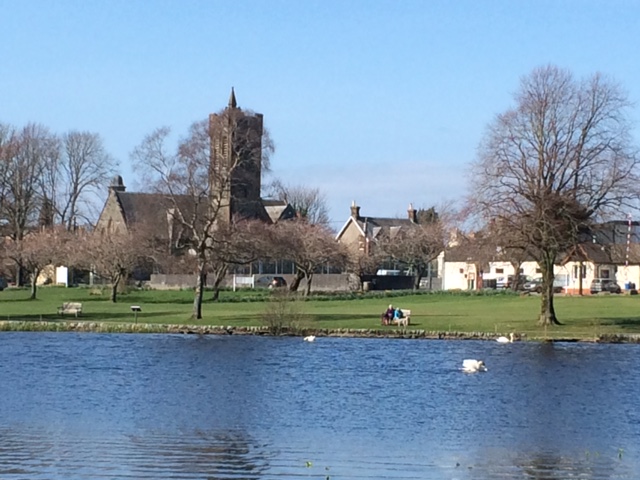
Castle Douglas
Then on Monday this week, the team traveled south to Castle Douglas, at the heart of scenic Dumfries and Galloway. The Christian Institute’s Nigel Kenny explained that one of the ways the Scottish Government planned to ‘teach’ young children the principles of “wellbeing” was by way of a snakes and ladders type game called On the Trail with the Wellbeing Snail.
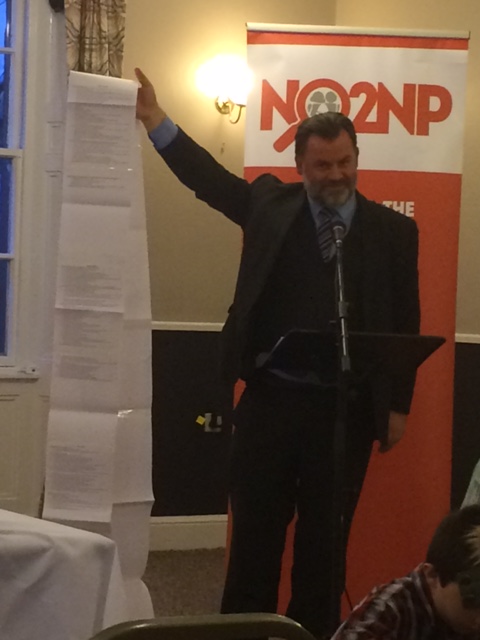
When Nigel explained that one of the cards for the game said that if you did not join the new after-school fencing club, you had to move back two spaces, one member of the audience asked us if we were making this up?! Not so, sadly. Others from the team mentioned the SHANARRI song and the GIRFEC Cluedo tool referred to earlier. The audience couldn’t believe that this was really happening! Nigel also pointed out that every named person would have to watch out for 222 risk indicators in each child or young person under their watch, which included: being under 5 years old, limited engagement by the parents and the parent having a different perception of the problem!
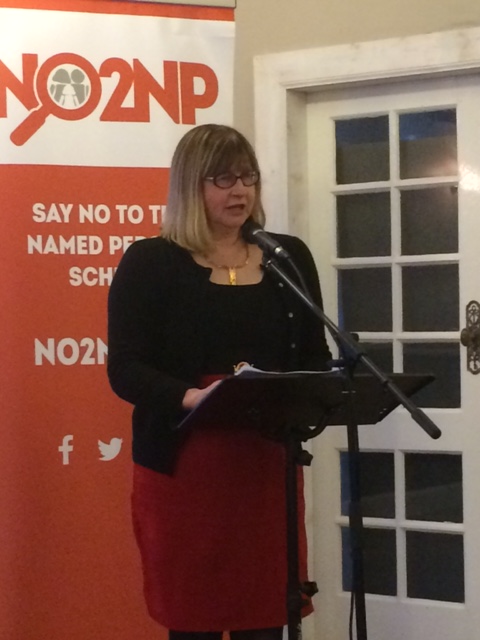
Alison Preuss said the acronym GIRFEC should really stand for Getting Information Recorded for Every Citizen. She pointed out that the principle of Named Persons was about being able to share sensitive data without the consent or even knowledge of the parents.
She highlighted datasharing concerns raised by a former UK Information Commissioner, Richard Thomas CBE, about an abandoned scheme similar to Named Persons, called ContactPoint. He said: “There are reasons why we need to promote better information sharing where children are at risk of harm, but whether the answer is to database every child in the country should be seriously questioned.”
Alison finished by quoting former US President Lyndon B Johnson, who once said: “You do not examine legislation in the light of the benefits it will convey if properly administered, but in the light of the wrongs it would do and the harms it would cause if improperly administered.” The Scottish Government failed to observe this principle, but NO2NP has been holding them to account throughout our campaign, highlighting the numerous problems with the legislation.
The NO2NP Team will be in Coatbridge on Wednesday next week. If you can join us, we look forward to meeting you!
AND NOW FOR THE NAMED PERSON PANTOMIME – OOOOH YES IT IS!
Posted 10 years agoAn extract from a talk by Alison Preuss of Home Education Forums, given at the Prestwick Roadshow on 8th December 2015.
Since it’s pantomime season, I thought I’d run through a few weel-kent lines (known as “messages” in government circles) from our favourite SHANARRI characters – audience participation is welcome!
Scottish Government: “Parents asked for a Named Person”
Audience: (All together now!) “Oh no they didn’t!”
Only a small subset of families in Highland whose children had specific needs and disabilities and who had been serially fobbed off by “services” felt a single point of contact might be useful. So what happened next? A compulsory Named Person scheme was imposed on every child with no opt-out, allegedly “because parents wanted it”.
Scottish Government: “Nobody complained in Highland”
Audience: “Oh yes they did!”
Some parents and young people have spoken publicly about what happened to them as the result of inappropriate actions by professionals. The question is: what happened to these complaints?
Scottish Government: “The evidence from Highland showed GIRFEC to be a great success”
Audience: “Oh no it didn’t!”
The Highland pilot was nothing like what has been legislated for as it was small scale, voluntary and targeted, as opposed to compulsory and universal. When an equivalent scheme was adopted universally in the Isle of Man, it caused meltdown in social services due to an astronomical rise in referrals. It was quickly abandoned and its centralised database has since been declared illegal and switched off.
Scottish Government: “Engagement with the Named Person is not compulsory”
Audience: “But look out, he’s behind you!”
Although you may not need to engage with the appointed Named Person, the data held on your children and all other family members by the “services” you do engage with is fair game as they are obliged to pass it on, if there are any “wellbeing” concerns. As one parent said, her son’s teacher knew she was pregnant before he did.
Scottish Government: “There’s no need to take Named Person advice”
Audience: “He’s still behind you!”
The consequences are clearly set out if you don’t co-operate or have a different perception of an alleged “problem”. This is child protection jargon used by social workers dealing with children at risk of significant harm, but has been hijacked to accommodate a much lower intervention threshold based on wellbeing concerns defined by the government.
Scottish Government: “The majority of professionals and children’s charities supported the scheme.”
(This is where you get the chance to boo loudly!)
Audience: “Booooooo!”
The loudest cheerleaders were vested interests who stand to benefit from providing monitoring or intervention services. They belong to the emerging “I Spy” generation of service providers, whose incomes depend on delivering government outcomes. Many of the “Cinderella” charities who are not funded (like Tymes Trust and Schoolhouse), parents’ groups like the SPTC and legal experts did not support the scheme, including CLAN Childlaw who have formally added their concerns about non-consensual data sharing to the legal challenge.
Scottish Government: “Joined up ‘services’ (and data) are good, ‘silo’ working is bad”
Audience: “Booooo!”
Once upon a time it was obligatory to undertake training to reach the required level of competence in, and certification for, a professional role such as teaching, midwifery, nursing or social work. These discrete professions are now disparaged as “silos” in the shared language of SHANARRI, where wheel-spinning is the only game in town and box-ticking the only qualification needed to assess wellbeing needs. So poor quality or downright dangerous decisions will be made by those without relevant professional assessment skills. We have already heard about teachers pontificating (sometimes dangerously) on health matters and housing officers proffering advice on education matters, with referrals being made on spurious grounds out of ignorance, arrogance or a combination of the two. No wonder child protection experts and the police are worried about the lack of focus on the most vulnerable children.
Scottish Government: “If it saves just one child.”
(This is the deadly serious pantomime finale)
When all else fails, the government and its cast of cheerleaders play the child protection card, but GIRFEC is not the answer when it comes to the deadly serious business of protecting vulnerable children which belongs with professionally qualified and trained social workers.
GIRFEC is actually having the opposite effect to that which was allegedly intended. It is deterring people from accessing services, since they know that their information is not going to be treated confidentially. Having dealt with a large number of parents who have had information gathered and later used as evidence against them, most are now exercising the right to remain silent. Booking in with the midwife used to be a happy experience, but is now an interrogation of every aspect of your life, including past relationships and family finances. And that is only the beginning of the intrusive data gathering which will continue throughout the child’s life.
I have recently been supporting a young mum who was being bullied by a multi-agency SHANARRI gang because she decided to home educate her child. Unknown to her, the Named Person had amassed huge amounts of hitherto confidential information on every family member and associated adult in a bid to trump up a whole raft of “concerns” about potential (not actual) risks to wellbeing in order to deny her choice. This included records on an estranged former partner, siblings and even a deceased relative, all presented at a hastily convened multi-agency meeting of complete strangers in the form of a report full of inaccuracies, hearsay and deeply personal information which left her feeling “violated” and “humiliated”. It became a bitter power struggle, with the education tail wagging the social work dog and insisting on assessment without grounds (essentially wasting the social worker’s valuable time). All because a Named Person happened not to approve of a parent’s lawful educational choice. So much for the helpful point of contact whose services you can supposedly decline.
I’ll finish with a wee anecdote of my own. Last week an annual tax summary arrived through the post from HMRC addressed to my husband, reporting his earnings for 2014/15 as £38673.30 and the tax and NI he had paid as £9024.72. You may be wondering why I would be sharing this sort of personal data with a bunch of strangers after all I’ve had to say on the subject, but it may make sense when I tell you that my husband has been dead for more than two years. The data on the database is completely wrong! At least it wasn’t a tax demand, but it still caused distress.
Almost as much distress as the letter sent to him last year urging him to vote a particular way in the referendum by a campaign group illegally using details from an old electoral roll. They never even bothered to acknowledge my complaint, let alone apologise. I have yet to tackle HMRC, but sometimes it’s best to let sleeping data collectors lie, no matter how inaccurate their sources!
The data mountain is increasing exponentially, a bit like Jack’s beanstalk (which grew and grew from Jack McConnell’s original integrated services and early intervention beans). Let’s chop it down to size, kill the Giant Database State and take the Big Ugly Sisters SHANARRI and the Named Person with it!






